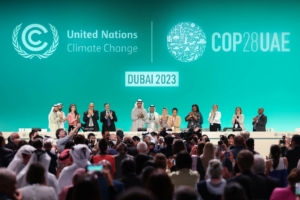Time to Make a Material Difference
by Gary Gardner

The close of COP28. Cause for celebration? (United Nations)
Well, COP 28 ended yesterday with (seeming) agreement to (sort of) walk down the fossil fuel ladder toward a (not for a while) sustainable future. Geez! It’s almost 2024, more than half a century since Limits to Growth was published, and the human family is in a pouting mood. Why is it like pulling teeth to do the right thing, sustainability-wise? Why are we sleepwalking toward a cliff?
There are many reasons, of course. But maybe one is that we don’t dare to think creatively, imaginatively, and, least of all, systemically. Too many of us seem to be governed by inertia and comfort and content with incremental change. We seem to miss the radical urgency of the moment.
What would it look like if we insisted on living like responsible humans, caring for each other—and for the planet that cares for us? What might it look like, for individuals, companies, and governments? My guess is that at each level, the principals would step back, look at the big picture, and work to respond to our crisis in as comprehensive and systemic a way as possible.
The Power of One
Each of us is an economic actor with a responsibility to shape a sustainable economy. “Consumer” is a title we should take seriously, given that consumer spending accounts for two-thirds of the U.S. economy, and it’s largely folks like you and me doing the shopping. If individuals drive the economy, it follows that we could play a major role in shrinking its size, one person at a time.
Many people already live simply and soberly, but the poster child for simplicity might be Lauren Singer, who gained prominence a decade ago when her YouTube video showed her entire waste load for a year. Odds and ends like clothing labels and fruit stickers that she’d been unable to offload constructively were squeezed into a single, 16-ounce Mason jar. On later videos Singer reported that the same jar held five years’ waste, suggesting that she had mastered an essentially zero-waste lifestyle.

Buying in bulk is part of a zero-waste lifestyle. (Laura Mitulla on Unsplash)
And that’s her systemic secret: commitment to a zero-waste lifestyle. It’s a comprehensive philosophy that extends well beyond curbside recycling to minimize her materials imprint on the planet. Singer recycles, composts, buys in bulk, and favors second-hand goods over new. She steers clear of plastic. She avoids packaging almost entirely, largely by making her own toothpaste, lotions, deodorant, and cleaning supplies, as her Trash is for Tossers blog describes.
Singer is an extreme example, to be sure, but her experience suggests what a systemic approach to consumption might look like. A zero-waste ambition looks and feels different from a promise to recycle aluminum cans, or to embrace meatless Mondays. Yet however marginal Singer’s experience, she asserts that it’s not difficult once you learn how to do it. She adds that her zero-waste lifestyle has left her richer, healthier, and happier—not a bad return at all, and benefits fully realized only because of her comprehensive systemic approach to it.
We consumers may not be ready to follow Singer’s example fully, but we have ample room to reduce our consumption and waste. In contrast to the nearly unappreciable contents of Lauren’s mason jar, the average American garbage can ferries nearly 1,800 pounds of waste to the curb each year. Each pound eliminated saves material, of course, but also energy, and it avoids changing the climate. Add these to richer, happier, and healthier, and you have an incentive package for the comprehensive approach to reducing one’s personal materials footprint.
Tapping Corporate Engines
Corporate PR departments work hard to display corporate efforts to green their operations. Just check out any of the annual corporate sustainability reports—80 percent of Fortune 500 and S&P 500 firms have one—that claim steady improvements in firms’ efficiency and waste reduction.
Yet corporate efforts to reduce materials use are often narrow in scope and ambition. Consider Delta Airlines, which is seeking to ditch the single-use plastic cups used in its in-flight beverage service. The company has designed and is now testing new paper cups made of materials that work well with hot, cold, and alcoholic beverages and are recyclable. If trials of the new cups are successful and the cups are adopted across the Delta network, they will eliminate nearly 7 million pounds of single-use plastics each year, the airline says.
Kudos to Delta for working to eliminate plastic cups. But couldn’t it have thought more creatively and systemically about its plastic cup problem, with greater benefit to itself, society, and the environment? Why not stop providing cups altogether and encourage passengers to bring their own reusable versions? Offer incentives, or maybe collaborate with designers of water bottles to build a cup into their design, once a feature of thermoses. Those bottles are already tucked into the side pouches of many a backpack carry-on!
Broader thinking like this could help create a societal commitment to re-usable products and reduced waste, a continent-sized version of Lauren Singer’s reuse habit. It would require a savvy PR campaign to prepare the flying public, but if successful, wouldn’t Delta’s enlightened practice spread quickly to other airlines? And from there to cafeterias, coffee shops, and virtually all take-out restaurants across the land.

Today’s ubiquitous water bottles could be designed for reuse and could replace disposables. (Jonathan Shembere, Pexels)
And not just cups: Why not replace disposable dinnerware generally with beautifully designed mess kits that are lightweight, durable, collapsible, and portable? In the process, businesses that rely on disposables could convert a cost center (the current disposables), into a money-maker (the reusable eating ware), sold at any food establishment and even on Delta flights!
Of course, any systemic critique of Delta would extend beyond its beverage service. The elephant on the plane is not in the cabin, but in the wings, in the form of jet fuel. One of the most difficult economic sectors to mitigate, aviation sports a large and growing carbon footprint because each flight uses tons (literally) of fossil fuel. Indeed, if global commercial aviation were a country, it would have been sixth among the world’s largest emitters of CO2 in 2019 (before flying took a dive during the COVID pandemic). Passenger air travel constituted the highest and fastest growth in individual emissions, even as the efficiency of aircraft and flight operations increased steadily.
Meanwhile, initiatives like “sustainable” aviation fuel, electric aircraft, and hydrogen aircraft all have serious drawbacks, leaving the industry still heavily dependent on fossil fuels for the foreseeable future. More creative and systemic thinking will be needed, outside-the-box thinking similar to swapping out disposables for reusables. A start in this direction is the innovative partnering practice some airlines have with rail companies to eliminate short-haul flights in favor of train travel. At least that starts to approach the solution—ending the habit of fossil-fueled flying—needed to reform airlines.
So yes, Delta’s work to eliminate single-use plastic is good. But it’s hardly the system-level overhaul we need from corporations.
Changing the Rules
If many individuals are slow to challenge the consumerist mindset, and if corporate efforts are unambitious in their sustainability ambition, governments are well positioned to set the stage for comprehensive, systemic change to alter patterns of materials use. On this front, encouraging news was announced by the European Union last week. The European Parliament and Council agreed provisionally to legislation “to make sustainable products the norm,” an unprecedented intervention in product design on the continent. The ‘take-make-use-dispose’ economic model used in industrial economies for decades “can be avoided,” they announced.
The new Ecodesign for Sustainable Products Regulation (ESPR) is one piece of the EU’s Green Deal, which seeks to put the entire EU economy on a sustainable footing. The ESPR will replace the EU’s 2009 Ecodesign Directive, which largely focused on energy efficiency. By contrast, ESPR covers a wide range of products and broadens the scope of requirements applied to each product, with the expected effect of decreasing the economy’s resource requirements and increasing their circularity.
Look at the adjectives describing the vision of the legislation; they are concepts that have excited sustainability researchers since the 1990s. Products should be durable, reusable, repairable, recyclable, and made of recycled materials. They should not contain “substances of concern” that reduce recyclability. Premature obsolescence—limiting a product’s lifetime via design features—will be prohibited. Destroying unsold products will be discouraged and in some cases, banned.

ESPR: Maybe we’ll value old and lasting over new and fleeting? (Wikimedia Commons)
The circularity and sustainability criteria should apply to a broad range of goods, including intermediate ones. So they will cover iron, steel, aluminum, chemicals, and textiles, as well as goods like, furniture, tires, detergents, paints, and lubricants,. And the law will apply to any product sold in the EU, including imported products.
The regulation also creates a “Digital Product Passport” to help consumers make more sustainable product choices. The ‘passport’ is essentially an eco-certification scheme that uses product tags to convey measures of the product’s sustainability.
Of course, the legislation could contain as many loopholes as it does inspiring passages of progressive law, so caution is in order. It’s not clear that it applies to online sales, for example, or to agricultural products, which have a huge environmental footprint. And it’s not clear if products will be evaluated using life-cycle analysis, to give the fullest understanding of their impacts, although some analyst believe it will. And it would be smart to expect industry blowback as the law is progressively applied.
The European Parliament and the Council must formally adopt the new regulation, which is expected in the first quarter of 2024. Within nine months after adoption, officials will unveil the first working plan, identifying the first products to be targeted. Product-specific requirements will be spelled out in further legislation. Each product will have its own transition period. If all goes well, the legislation’s impact could begin to be felt within a year or two.
Close, but no Cigar
Of course, none of the exemplary cases cited or suggested here would guarantee a steady state economy. They are about making resource use more efficient rather than capping or scaling back total materials use. But surely zero-waste lifestyles, redesigned travel, and rigorous rules for a materially simpler economy is more congruent with steady statesmanship than simply recycling, re-designing paper cups, or a focus on efficiency. A comprehensive, systemic approach could make all the difference.
Suppose, for example, that beyond a focus on minimizing waste, people worked to reduce their entire materials footprint. They’d be keen to reduce their carbon footprint, of course, and they’d likely find that the simplest and surest path is to greatly reduce the sheer volume of material in their lives.
Shopping for services rather than goods would likely help. Appreciating nature—at parks, on hiking trails, even on neighborhood walks—rather than seeking distraction at the mall or on TV would deliver meaning with a minimum of material. Pursuing friendships and community involvement is another materials-lite path (in principal, at least) to an enriched life. The guiding ethic: tread lightly on the earth.

The future of transatlantic travel? (For a few). (Dave Smith, Flickr)
Suppose, too, that corporate commitment extended beyond greening its margins to a wholesale rethinking of its very purpose. Airlines would have a particularly tough go of it, as there is no avoiding the reality that fossil-fueled flights would have to end, and alternative fuels and technologies are distant and in any case still materials-intensive. Airlines could think creatively and look to the long run, exploring investment in cleaner modes of transport such as airships and sailing ships. But the emissions and materials math would have to pencil out, and it’s hard to imagine that sustainable long-distance travel could survive at today’s scale. (Which points us back to the individual, who will have to lower expectations of the material base of their lifestyle.)
At the government level, suppose that the EU applied ESPR aggressively across all product categories, and that it continued to lower its population growth rate, which averaged less than 0.2% annually over the past decade. These developments would arguably constitute a credible down payment on a resource-use cap and a steady state economy. But it would require an unflinching commitment to radically reducing the material footprint of the EU economy.
Approached systemically and creatively, the timid signs of progress commonly cited today could be enlarged and multiplied, boosting our confidence that a steady state economy could be within reach. No more weasel words in final communiques of international sustainability conferences. It’s time to step up our game and insist on seeing a material difference.
Gary Gardner is CASSE’s Managing Editor.




Hi Gary
The premier of Alberta (Queen of Ft Mac) Danielle Smith attended with
100+ O & G psychopaths in tow to promote the full steam ahead on
throwing more CO2 into the atmosphere. Copout 28 is a joke.
Read Monbiot latest post to perhaps get a better perspective.
The false hope really is misplace in your article because the ship
has already sailed. Cop28 truly was a trade show and most attendees
would only get a hearing if they were on the use more fossil fuel gravy
train. Enough said.
I think I have the answer. Wait. Many billionaires are selling their “goods” to try to make as much money now on this topic as possible. However, when oil runs down to become a hard-to-produce commodity sometime later this century, things will just happen without any political bent. People will be strapped for transportation fuels, easy gas for the car to run to the Pro sports stadium or their local eatery. In the end, if you have patience and fortitude, the population will naturally slowly come down to a more appropriate resource usage pattern. More like 1960 than 2023. Then, things stabilize. All the while the Amish will flourish in preparation for all of this. Fuels to heat homes and businesses will fade and things will get dicey in colder latitudes during winter periods.
In all seriousness – there is a lot going on now to “curtail” CO2 – without realizing just how fast Oil will diminish in decades to come. It solves itself. “Naturally”. this is likely how the religious groups will call “armageddon” – the new-age. Leaving the old age of easy oil, easy transport, easy baby-making – and doing things deliberately and intelligently. Pray for our grand-children and billion+ babies born between 2010 and 2030.
Gary, if we can measure it we can improve it. At an individual level is there some sort of scoring system anywhere that individuals can survey themselves on. Maybe a carbon score and a waste score with a weighted average ethical score. Let’s say Lauren gets 90percent ethical score. Scores boosted if shopping at not for growth not for profit providers.
Individuals may want to improve their scores. Share their scores and build ethical reputations within a community of ethical consumers while putting in the foundations of systemic change by directing demand to nfp not for growth suppliers
Watch to Nate Hagens’ Alexa Firmenich: “Biodiversity, Beauty, and Being” | The Great Simplification #106 on youtube. Apparently the EU has been enacting all sorts of progressive regulations.
And then utterly giving up on enforcing them.